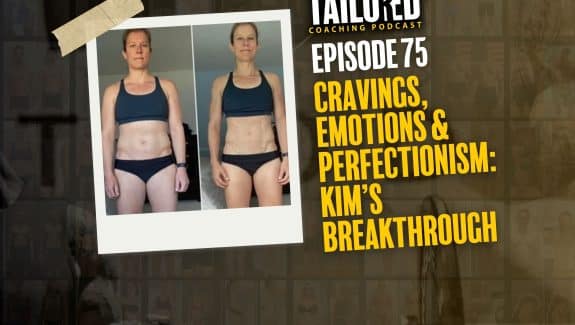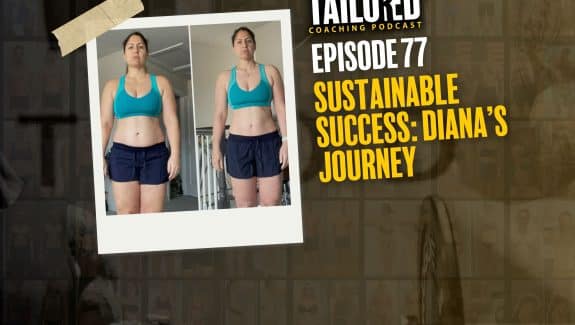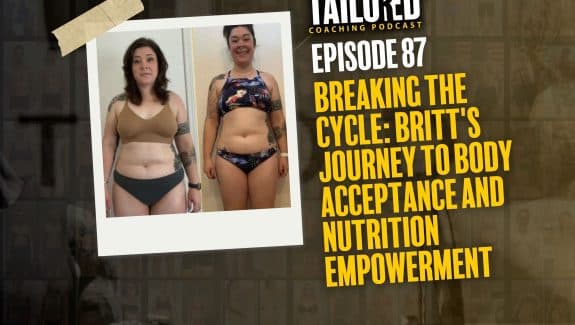I developed a framework for our fitness and nutrition coaching that takes our clients through a transformation in which not just their physical body transformed. Their physiques definitely transformed, but so did their minds. And what I began to notice as this happened, was that the transformation they had with their mindsets began to shift their lives entirely… Their careers, their relationships, their emotional well being…
Which is why I called this process Self-Formation. It’s the transformation of one’s entire-self. But it starts with the physical, because fitness is the catalyst for this growth.
I’ve presented on this for our members inside of the Tailored Coaching Collective, I’ve coached countless clients on this, and I’ve lead my entire team through the framework, over and over again, because this is our coaching philosophy and what I believe to be the culprit behind the most impactful transformations our clients experience.
So in this article, you’re going to read on this exact process. However if you want the Real, Raw, and Relevant version of what this is and how it came about, listen to my podcast on this topic below ↓ or if you want a summarized version of my podcast, that takes the framework and summarizes the key points into detailed categories and bullet points, just continue reading because this article is what Chat-GPT created out of my personal podcast:
The Four Pillars of Self-Formation: Transforming From Within

True transformation isn’t just about achieving a goal—it’s about reshaping your inner self to align with your purpose and values. This is the essence of the Self-Formation Process, a structured approach that takes you beyond surface-level changes, guiding you to develop lasting qualities that fuel personal growth and achievement.
At the heart of this journey are the Four Pillars of Self-Formation: Self-Control, Self-Discipline, Self-Belief, and Self-Respect. Each pillar represents a milestone on the path to becoming the best version of yourself. Here, we’ll break down these pillars and how they collectively enable profound transformation.
Pillar 1: Self-Control – Mastering Restraint and Limitation
Self-Control is the foundation of self-formation, embodying the discipline to manage impulses and choices. It begins with learning to restrict—to make conscious choices about what you avoid to stay aligned with your goals. This may mean avoiding foods that derail a diet, resisting the urge to skip workouts, or abstaining from negative influences that pull you away from your purpose.
Developing Self-Control:
- Restriction: Start by identifying areas where restraint is necessary for your growth. For example, in a fitness journey, restricting certain foods or habits is essential. While it may feel uncomfortable at first, restriction builds resilience and helps you stay on track.
- Limitation: After learning to restrict, practice limitation. Instead of complete avoidance, allow yourself controlled, mindful interactions with temptations. If you’re restricting certain foods, for example, try reintroducing them in small, intentional amounts to build control.
- Planning and Following Through: Implement self-control by setting specific goals and committing to them. Whether it’s sticking to a weekly workout plan or a healthy meal routine, intentional planning ensures you follow through with consistency.
Self-control is challenging, but as you master it, you gain a sense of empowerment that carries over into other areas of life—from managing stress to improving personal relationships.
Pillar 2: Self-Discipline – Strengthening Through Repetition
Building on self-control, Self-Discipline is the commitment to keep pushing forward, even when motivation is low. Self-discipline is the steady rhythm that propels you toward goals despite the challenges. It’s the practice of doing hard things repeatedly to strengthen your resolve and build mental and emotional resilience.
Key Components of Self-Discipline:
- Challenge Yourself Regularly: Introduce difficult tasks into your routine to build mental toughness. This could mean tackling physical challenges, like regular cardio sessions or strength training, or mental ones, such as reframing negative thoughts into constructive ones.
- Set Clear Goals: Goal-setting reinforces discipline. When you commit to specific, challenging goals, you create a blueprint for growth and increase your ability to withstand discomfort.
- Practice Intuition: Once you’ve established discipline, test it. Practice intuition by making choices based on knowledge and internal guidance rather than strict rules. This helps you develop a natural sense of what supports your goals, empowering you to sustain progress without external accountability.
When self-discipline becomes a part of who you are, it no longer feels like an effort but a natural expression of your commitment to growth. You’ll find it easier to stay on course and trust in your ability to follow through.
Pillar 3: Self-Belief – Cultivating Confidence Through Evidence
Self-belief is the confidence that comes from seeing yourself grow. It is the belief that you are capable of achieving your goals, no matter how challenging they may be. Self-belief stems from the proof you gather along the journey, rooted in moments where you pushed past discomfort and succeeded.
Building Self-Belief:
- Visualize Your Goals: Take time to create a vivid image of what you want to achieve. Picture yourself reaching your goals and embodying the traits that will get you there. Clear visualization strengthens your resolve and reinforces the belief that you can succeed.
- Choose Logic Over Emotion: While emotions are valuable, they can cloud judgment in moments of difficulty. Train yourself to respond with logic rather than emotional reactions, especially in challenging situations. When doubts arise, remind yourself of the reasons and evidence that support your success.
- Watch the Tape: Reflect on past successes to build confidence in your abilities. When doubt creeps in, mentally review the times you’ve followed through on commitments and overcome obstacles. These experiences serve as reminders that you can continue to succeed, even in the face of new challenges.
Self-belief is a powerful motivator, empowering you to maintain momentum and overcome self-doubt. As you strengthen this pillar, you start to see setbacks as opportunities for growth rather than barriers.
Pillar 4: Self-Respect and Confidence – The Ultimate Outcome of Transformation
Self-respect is the reward for honoring your values and actions. It’s the sense of worth that arises from consistently aligning with your goals and making choices that reinforce your identity. This respect naturally fosters self-confidence, which helps you maintain your progress and stay true to your path.
Cultivating Self-Respect and Confidence:
- Acknowledge Your Progress: Regularly take stock of your achievements, no matter how small. Recognize the moments you honored your goals and stayed disciplined. Celebrate these victories, as they reinforce self-respect.
- Hold Yourself Accountable: Public accountability—sharing your goals and progress with others—helps reinforce your commitment to self-respect. Knowing that others are watching can provide the extra motivation to stay consistent and honor your commitments.
- Value Yourself: True self-confidence is grounded in a sense of self-worth. Remind yourself that you are deserving of success, happiness, and fulfillment. When you cultivate this belief, you’ll find it easier to maintain consistency and pursue your goals with conviction.
The final outcome of the self-formation process is a sustained transformation. By committing to each of these pillars, you not only achieve personal goals but also build a lifestyle rooted in purpose, resilience, and self-respect. This deep alignment with your values creates a foundation that supports ongoing growth and fulfillment.
Conclusion: Embracing the Self-Formation Process
The journey of self-formation is a powerful path to transformation. By developing self-control, fostering self-discipline, nurturing self-belief, and embracing self-respect, you build a sustainable framework for success. This is more than a process for achieving fitness goals—it’s a way to evolve, creating a ripple effect that influences every area of your life.
Transformation isn’t just about reaching a goal; it’s about becoming the person capable of maintaining it. Embrace the self-formation process, and you’ll unlock a version of yourself equipped to handle life’s challenges with strength, purpose, and grace.


























































































































































































































































































































































































































































































